Anglican Theology Review

July, 1944
Whitehead’s Idea of God
by Star McDaniel Heimsath
Evanston, Illinois
Those who rest content in believing that the Faith was once for all delivered to the saints and that the chief virtue in life is an unquestioning adherence to that Faith do not need and should not be confronted with Whitehead’s system of philosophy. Dean Brown of Yale used to warn his students against developing into young zealots who roused up dragons – or was it demons – only to exercise their prowess in s1aying them. Such might better busy themselves with digging a ditch; ditch-digging, though a humble, is at least a socially useful occupation, which is more than can be said for the work of some young ‘theologs’ who unnecessarily disturb and distress devout people.. Growing older has its compensations if one comes to value the Dean’s admonition and to respect the simple, and ennobling faith which sustains multitudes of people through crises and tribulations that drive more inquiring souls away from the church or headlong into nervous disorders. Benedictae personae!
But the inquiring souls are amongst us, and their insistent demands for an explanation of evil and for a conception of Deity which gibes with their scientific understanding of the universe have swelled to a clamor-sometimes challenging and derisive–just now, in the turmoil and the suffering of war, appealing and urgent.
It should hearten every seeker after truth that, in addition to philosophers and theologians, many of the ablest scientific minds of this generation have given serious consideration to these demands, notably men of the caliber of Eddington, Jeans, Compton, Montague, and Whitehead. No one of these, nor all of them together, may provide a wholly satisfying answer, but it remains a highly encouraging fact that so many have undertaken the task of helping us to reorient our thinking so that religious faith may not perish from our souls.
However one may feel about the truth or adequacy of Whitehead’s philosophy, there can be no mistaking the religious earnestness of his writings. As J. S. Bixler of Harvard says, “It is the religious aspect of the changing world which haunts the readers of Whitehead’s books.”
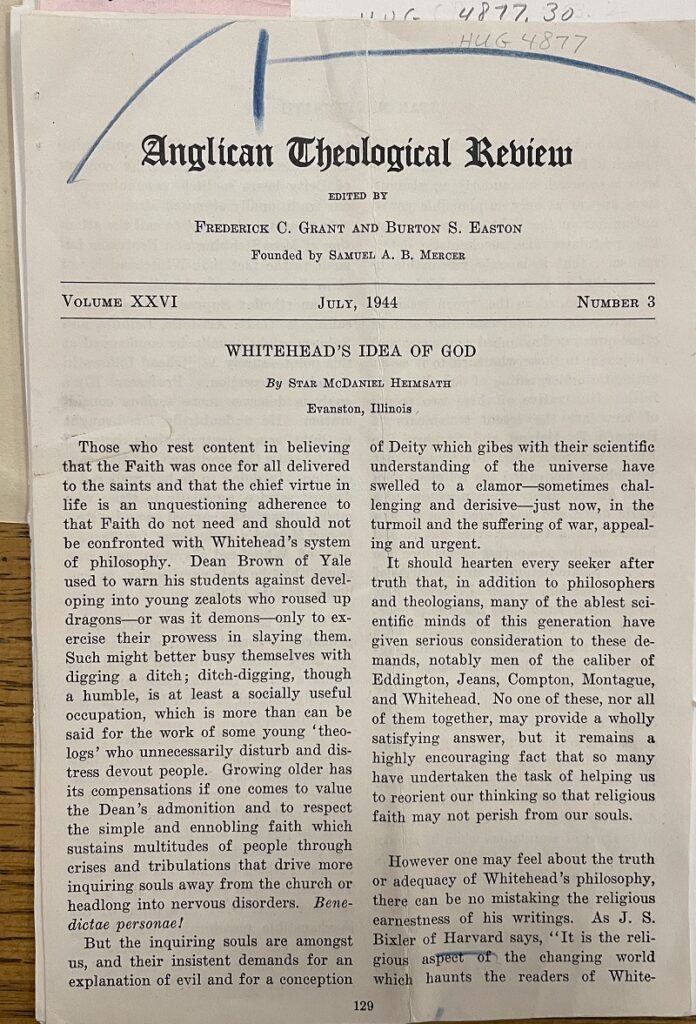
Nevertheless, his aproach to fundamental philosophic problems is so novel, his underlying assumptions appear at once so plausible yet so unfamiliar in the light of classic scientific postulates (i.e. mechanistic determinism), that it is only reasonable to expect that in some quarters his system should be hailed as the ” open sesame” to new religious understanding and in other quarters denounced as a snare and a delusion to those who turn. to it as an authentic undergirding of our Christian faith. Illustrative of these two points of view are the recent statements of Bernard E. Meland and Stephen Lee Ely. Professor Meland writes that Whitehead has called the religious man from his ” lethargy of acquiescence to a static deity and has urged him to join hands with a Creator. He has roused him from the pampering of his own ego … to participation in an enterprise of ‘ vast proportion. . . . ”2 Professor Ely, on the other hand, says that the primordial nature of Whitehead’s God is” little more than an automatic device for suggesting ideal possibilities of value . . . ” and that God’s consequent nature. “merely shows that God is very ingenious in devising ways of enjoying what seems evil to us and this does not by any means vindicate his moral character.” 3 He also quotes Miss Stebbing ‘s harsh criticism, “Professor Whitehead’s indefensible usage_ of language becomes little short of scandalous when he speaks of God … , ” and Corliss Lamont’s compaint that Whitehead ” has seen fit to confuse his readers” by continuing to use the term ‘God’ when his concept of Deity bears so little resemblance to our traditionally accepted idea.
In passing one ought to call the attention of Miss Stebbing and Professor Lamont to the fact that Whitehead is not alone in conceiving a highly specialized and unorthodox Supreme Being and in calling it ‘God’: .Aristotle, Leibniz, and Spinoza might equally be condemned at this point – surely Whitehead follows in a noble succession. Professor Ely’s analysis deserves more serious consideration. He undoubtedly has brought to light some contradictions between Whitehead’s God and our Christian conception. In doing so he has rendered a distinct service, especially to those who might otherwise be carried away by Professor Meland ‘s enthusiasm for one aspect of Whitehead’s system and who might thus be led, uncritically, to embrace his idea of God.
The real issue for us, however, is not primarily a consideration of what others think about Whitehead’s God but rather a search for what may prove religiously helpful in Whitehead’s organistic philosophy.
I must asumme that the reader is familiar with this general scheme in which the basic units of reality are ‘ actual occasions’ – ‘ drops of experience’ as Whitehead sometimes calls them – each unit with its physical and its mental ‘pole.’ The actual occasions ” are the final real things of which the world is made up.” The mental pole consists of the actual occasion’s ( A. O’s) perception of the inexhaustible possibilities, the’ ‘eternal objects’ (E. O.s) which comprise the primordial nature of God; the physical pole consists of the A. O’s ‘prehension’ .. of other A. O.s, including God who, though vastly greater and more complex, is also an actual occasion.
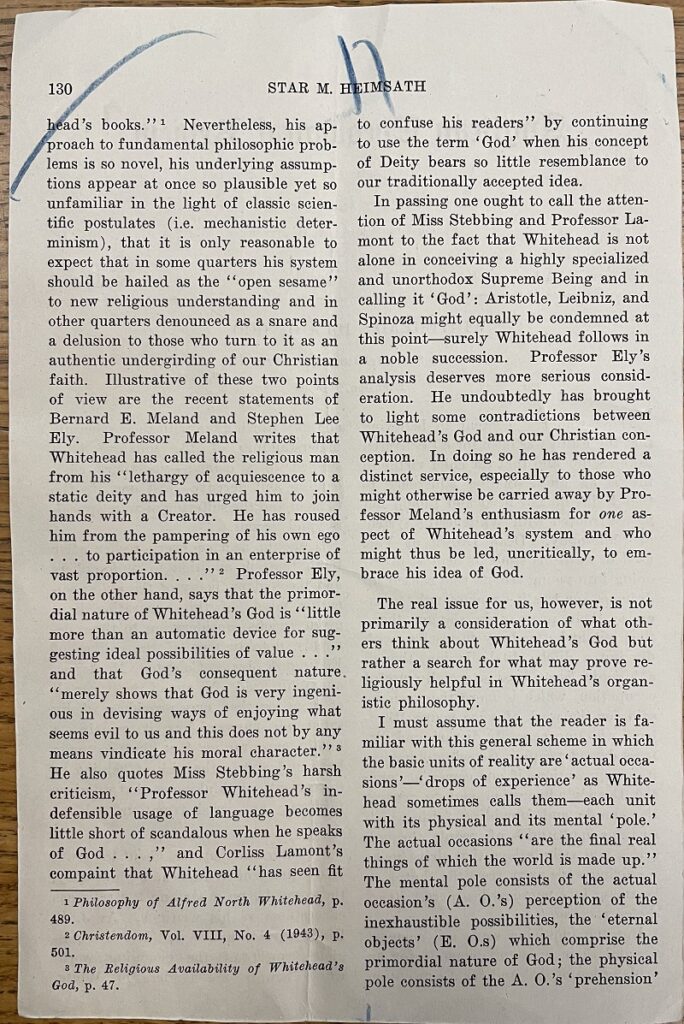
The underlying assumption is, therefore, that everything is basically mental, even the physical pole since it ‘prehends’ not material things but other drops of experience. Whitehead’s term, ‘prehends,’ like his specialized use of ‘physical, ‘ ‘mental’ ( which only occasionally implies consciousness), ‘subjective aims,’ ‘decision,’ ‘publicity,’ etc., is most carefully defined : it refers to ” the general way in which the occasion of experience can include, as part of its own essence, any other entity, whether another occasion of experience or an entity of another type, ‘ ‘ such as, for instance, eternal objects. Such precisely defined terms should delight Sir James Jeans who cites 4 philosophers’ inexact use of words as one of the three chief barriers to better understanding between philosophers and physicists.
I must assume also that the reader has some general understanding of Whitehead’s chief characteristic of reality, namely, Creativity. He is at great gains to make this concept clear and, though only a thorough understanding of his system will result in an exact knowledge of what he does mean, the following description should help one to glimpse the daring originality of his thought:
” Creativity is a metaphysical principle belonging to the nature of things, that there is nothing in the Universe other than instances of this passage . . . ” and, ” Creativity expresses the notion that each event is a process issuing in novelty.” 5
To be sure, Heraclitus had said that ” all things flow” but Plato’s static ideal ‘forms’ and the classical physicists’ billard-ball atoms had pretty well obscure his glimpse of truth. Most philosophers and all but the foremost scientists still tho ht-when Whitehead began to write-1 · terms of ‘things’ to which velocity, acceleration, and direction were imparted ‘by other ‘things’ which had, in turn, received them from yet other ‘things.’ Such ‘things, ; static unless acted upon, composed the basic physical units of the material world. Since, on this assumption, startling advances had been made in practical industrial inventions and also in approximately correct predictions of astronomical occurrences, it took no small degree of daring for Whitehead to challenge the accepted materialistic – and hence mechanistic and deterministic view of nature.
In his system, Creativity, the emergence of the genuinely novel (i.e. unpredictable) event, supplants the determinism of classical mechanics formulated by Newton and developed by Maupertuis, Laplace, Hamilton, and others. Jeans, summarizing Laplace’s point of view, writes:
”. . . if the state of the world at its creation were specified in its minutest details to an infinitely capable and infinitely industrious mathematician, such a being would be able to deduce the whole of its subsequent history. Nothing would be uncertain for him; the future as well as the past would be present to his eyes.’ ” 6
It is important to note that the omniscience of such a being differs from that of our orthodox God in a significant manner: this master-mathematician is, after all, only carrying to infinite perfection a well-understood method of ordinary men, while God, presumably, arrives at fore-knowledge in a strictly supernatural manner.
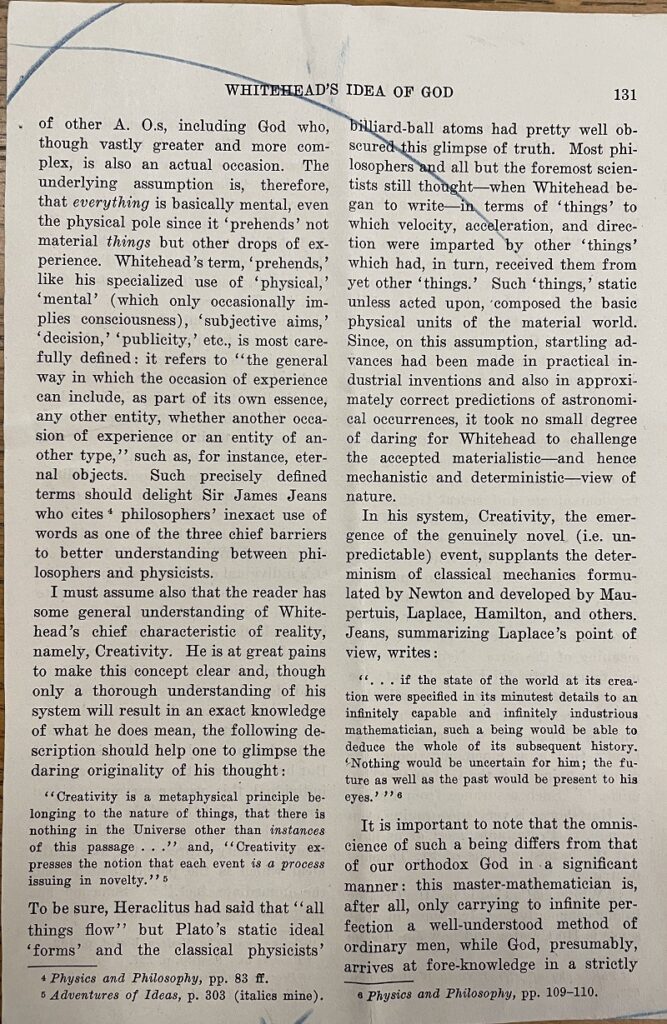
How God can fore-know without having fore-ordained is a knotty problem which has beset theologians for centuries and one which ‘ quite happily, does not concern us here. The reason that it does not concern us is that Whitehead makes no claim for divine omniscience. Such an attribute ‘
according to his view, is neither important nor particularly desirable. The vitally important fact is the continual emergence of the genuinely novel event: freedom of choice, he says, is grounded in the nature of things!
We have now arrived at the place where we can see how the aforementioned doctrines of the A. O.s and E. Q.s, of Creativity, and of individual freedom merge and reveal God as the corner-stone or fountain-head of Whitehead’s system. But, lest such a statement seem to imply that Whitehead subscribes to our orthodox conception of Deity, let me hasten to say quite definitely that it does not. God, for Whitehead, is not the Creator in our biblical meaning of the term. Neither literally nor figuratively did his God· create the heavens and the earth and all that dwell therein ; nevertheless, as Professor Charles Hartshorne well says, ” Whitehead’s God is as much, nay more, the supreme being as is the God of the Thomists.” 7 Such assurance from Prof essor Hartshorne is very encouraging even though, as Protestants, most of us have but the haziest notions of St. Thomas’ doctrines.
If Whitehead’s God is not the Creator in our commonly accepted sense, in what sense is He Creator and how can He be the Supreme Being? Omitting the intricacies of Whitehead’s theory of concrescence, we may state simply that the organistic philosophy sets forth that nature is a structure of evolving processes. The reality is the process.” 8 And, defining process as more than mere change or passage, he says, ” Process is the growth and attainment of a final end.” 9 The creative process, then, is conditioned not only by the past but also by the future. Theoretically, an A. O., in its first stage of becoming, prehends all the antecedent A. O.s, but practically, its prehension is limited to those A. O.s in the actual world which are relevant to its becoming. If this kind of prehension, alone, determined the creative process it would not differ too much from the deterministic explanation of materialism. But – and this point is crucial for the understanding of the role of Whitehead’s God – the A. O.’s individual creativeness depends also on its prehension (i.e. incorporation into its own being) of certain E. O.s, that is, its selection as its ultimate goals certain of the potentials of value present in the primordial nature of God. Whitehead, describing this aspect of God’s nature, writes, ” viewed as primordial, he is the unlimited conceptual realization of the absolute wealth of potentiality.” 10 But besides presenting to the developing individual this vast reservoir of ideal possibilities, God ‘lures’ the A. O. to accept such values as are appropriate to its being. ” Deity expresses the lure of the ideal which is the potentiality beyond the immediate fact.” 11
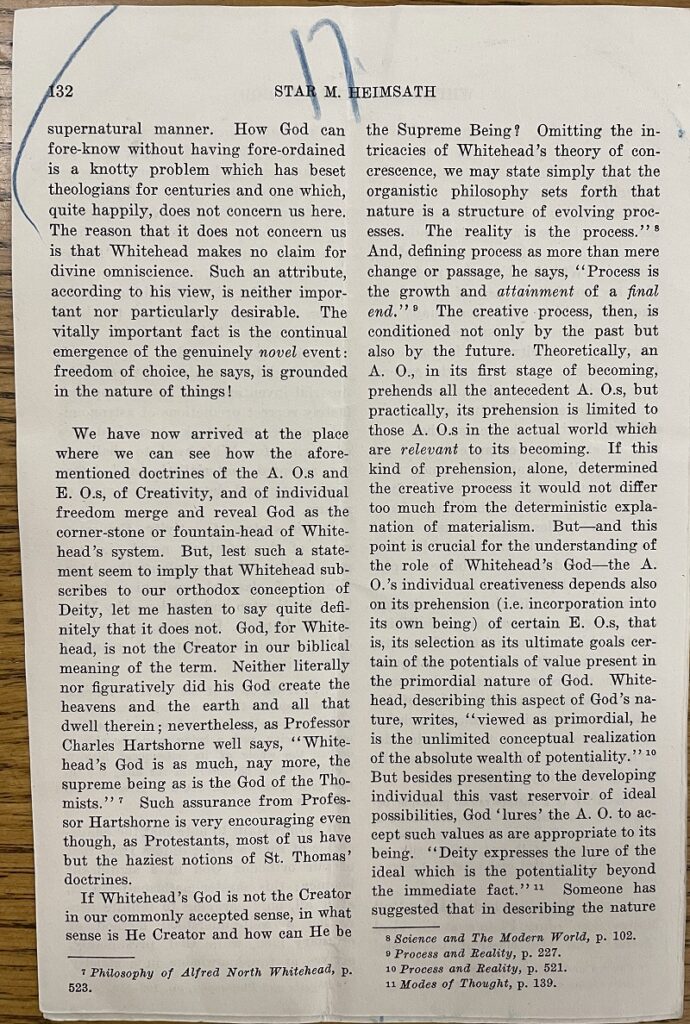
Someone has suggested that in describing the nature and function of ‘lure’ Whitehead has created a new category of thought. The effectiveness of this ‘lure’ can be amply illustrated in the lives of countless saints and of an innumerable host of upward striving persons throughout the centuries ; and this effectiveness we must clearly understand is due, not the operation of any physical compulsion nor to the overpowering activity of any super
natural Being but rather to the drawing or persuasive power of ‘the object of desire.’ God is to be conceived, then, as wooing the temporal entities ( the A. O.s) , as inspiring in them, as an expression of their several unique individualities, a desire’ to incorporate some of the divine possibilities which He envisages. It is this doctrine which has led John Dewey to say that he regards Whitehead as an outstanding exponent of the democratic ideal.
In Whitehead’s sense, God is still a Creator in that the A. O.s draw upon His being for their sources of original · creativeness and in that they are persuaded to do so by the lure of the E. O.’s, i.e. divine potentialities: “In this function, as in every other, God is the organ of novelty, aiming at intensification” of the aesthetic appreciation in the individual.
It is obvious that no other kind of Creator is possible within Whitehead’s metaphysical system which counts the spontaneous creative act of each A. O. as a basic fact in the universe. And what is more important for us, such a description both of God and of man (who, though complex, still functions in principle like the simplest A. O.) offers an explanation of two otherwise very baffling problems: the origin and nature of freedom and the origin and nature of evil.
The origin of freedom according to Whitehead, is from the beginning ( though he does not admit any temporal beginning) and freedom permeates all reality, though to be sure its range enlarges in proportion to the increasing complexity of the individual A. O. The origin of evil as well as its nature is now seen to stem from the A. O. ‘s . choices. If it chooses as its subjective aim those goals which form obstacles to the attainment of the goals of other A. O.’s, then evil results. It is now no longer necessary to postulate the existence of an Evil One who tempts us. But of course one may say that modern criticism has already ruled out a personal Devil. True, but only to find itself confronted by a far more serious problem, namely, that of explaining the source of evil. For, if God is Creator in our orthodox sense, surely He must in some degree be responsible for the evil in the world. Whitehead, by postulating just the kind of Deity he has and by making personal freedom of choice germane to the nature of being, has not only cleared God of responsibility for evil but has explained its nature. Evil results when individual choices are restricted to the attainment of what appears a personal good – ignoring the larger perspective that the good of all works ultimately for the good of each: the fates of men being inextricably interwoven!
So far we have considered only one aspect of God’s nature, his primordial, which Whitehead characterizes as ”free, complete, eternal … and unconscious.” But his consequent nature is fully actual, conscious, changing. In this aspect God is wholly actual because he prehends not eternal potentialities but finite, temporal actual occasions. ”
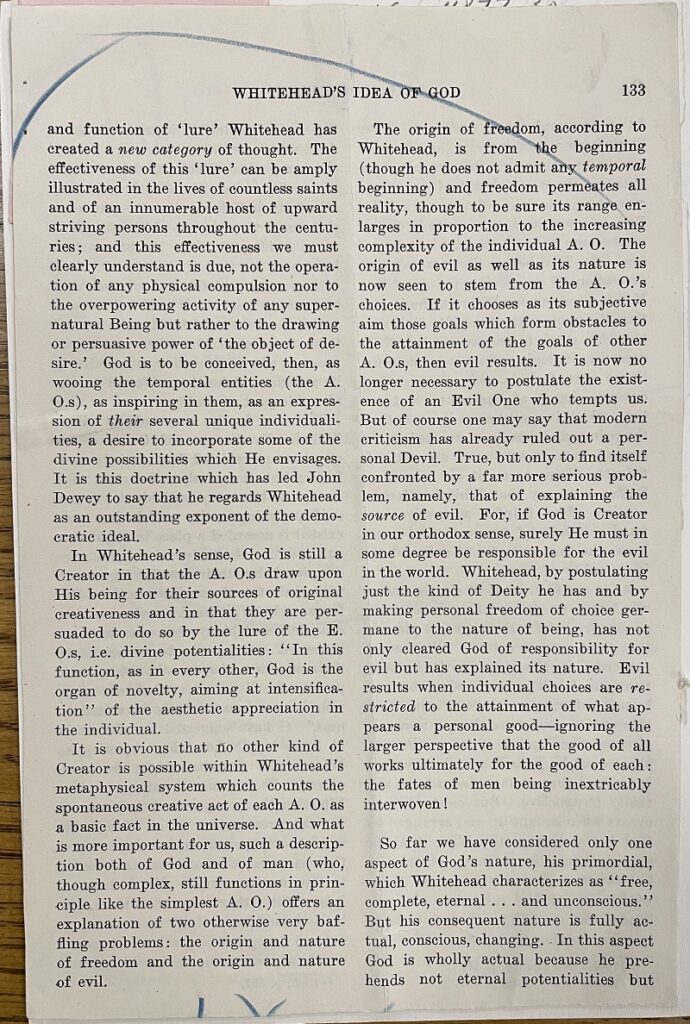
The truth itself is nothing else than how the composite natures of the organic actualities of the world obtain adequate representation in the divine nature. ” 12 God, as consequent, is necessarily changing because he is continually incorporating into His being the never-ending succession of developing finite entities. Nothing can surpass Him but he is continually surpassing Himself! This doctrine has much to recommend it both in regard to its logic and its common sense. Space here forbids more than a most cursory sketch of the consequent nature, which is a pity since it, more than the primordial, has been attacked on the ground that its attributes are not sufficiently divine to merit our adoration. Suffice it to say that Whitehead’s conception offers helpful suggestions toward solutions of two perennial problems: the final outcome of evil and the immortality of man.
As to the first, let it be clearly understood that we are speaking here of the final outcome of evil, that is, its place in God’s consequent nature. We are not concerned in this paper with the poignant and I believe unsolved problem of human suffering as it affects man. Certain events, considered from a narrowly circumscribed point of view (i.e. human) must be judged as evil since their individual characters are seen to be mutually obstructive. But most of these events when caught up and arranged by God in relation to the Whole may be seen no longer as mutually obstructive but rather as mutually adapted. ” The wisdom of [God’s] subjective aim prehends every actuality for what it can be in such a perfected system . . . ” 13 ( i.e. the divine nature). Some particularly destructive events which cannot fit into the harmonized Whole, God is thought of as dismissing ” into their triviality of merely individual facts’ ‘- which action comes very close to obliterating evil as an abiding factor. Doubtless theologians of the future will come forward with a more satisfactory solution, but one must admit that Whitehead’s explanation marks a notable advance beyond those theories which either ignore the presence of evil altogether or, admitting its actuality, claim that it forms an unalterable part of reality.
There is, finally, a catholicity about Whitehead’s doctrine of God’s consequent nature which I find not only comforting but enormously reassuring. Not man alone but every individual, minute, swift-perishing entity which has ever existed is accorded a place in the divine nature: ” … the temporal occasions are completed by their everlasting union with their transformed selves.” 14 Unfortunately, Whitehead has seen no way, consistent with his system, whereby these redeemed entities can be conscious of their salvation; they are “a living, everpresent fact” but it is God, not they, who is conscious of their ‘everlastingness.’ (I have suggested elsewhere and at some length how this objection to Whitehead’s doctrine might be overcome.) Furthermore, not only does Whitehead’s conception of God provide for the preservation of all things, his whole metaphysical construct rests upon God as primordial and moves forward to God as consequent.
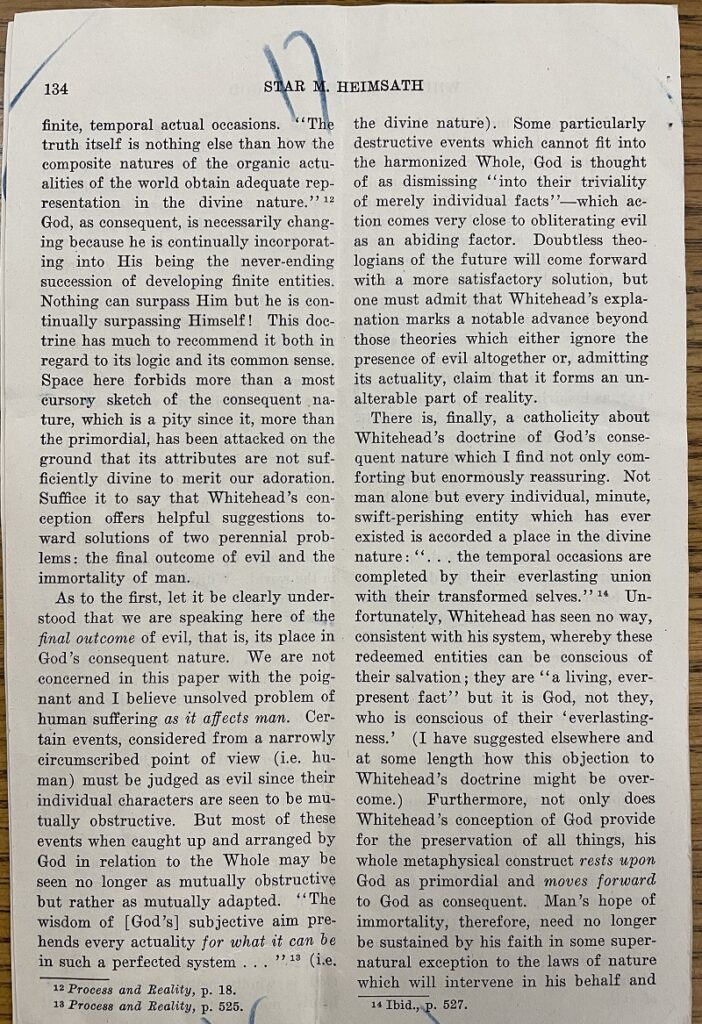
Man’s hope of immortality, therefore, need no longer be sustained by his faith in some supernatural exception to the laws of nature which will intervene in his behalf and preserve his soul after death. Rather he sees that such preservation is grounded
in the nature of _the universe!
The beliefs which we hold dear – and without which life is meaningless and death and implies oblivion – were easily tenable in the days when the Gospel was spreading throughout Palestine and the Roman world. They fitted also into the medieval view of the universe as crystallized in Dante’s Divine Comedy. But the discoveries of Copernicus, Galileo, Newton, and the 19th Century scientists have rendered it progressively more difficult for the man of faith to do more than cling to his beliefs in the face of mounting scientific evidence to the contrary. Whitehead’s system and his conception of God may not represent the final version of Truth as it may be revealed in the future, but like St. Thomas – and to a lesser degree Kant and Berkeley – he has, with his vast learning and his intuitive grasp of the nature of reality, given us a new grip on things eternal. The inquiring souls and the ‘faithful’ alike have, because of him, seen a great light.
